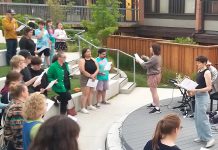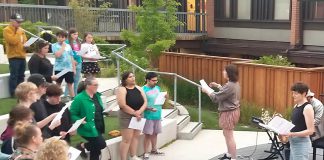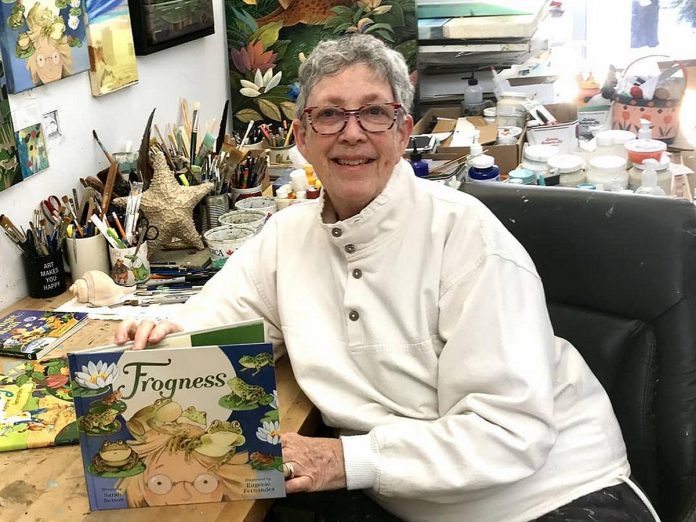
With more than 100 illustrated books under her belt and an additional 20 that she both written and illustrated, Eugenie Fernandes almost makes it look easy to become an award-winning children’s author and illustrator.
The Kawartha Lakes artist will be reading from her latest children’s book When Rabbit Was a Lion at the Art Gallery of Peterborough on Sunday, February 18th as part of the Peterborough Snofest winter family festival.
During the gallery’s Family Sunday drop-in event during Snofest, Eugenie will be in the main gallery at 1:30 p.m. and again at 2:30 p.m., when she will also read from another children’s book she has illustrated, Sarah Nelson’s Frogness, as well as demonstrate making clay creatures, draw with her eyes closed, and sell and sign books.
In Eugenie’s book When Rabbit Was a Lion, an introverted rabbit throws a costume party for his friends even though he doesn’t like noise and parties. When it gets lively and loud, Rabbit slips away until his friends come to find him.
“Sometimes people don’t like a lot of stimulation and parties can be a bit much for some people,” says Eugenie, noting that the book often resonates with her young readers. “People usually identify with Rabbit and knows how he feels, so it’s really about accepting each other as we are.”
The character was inspired by Eugenie’s husband, animation designer and painter Henry Fernandes, who she met while studying at the School of Visual Arts in New York City. The couple built their careers there, writing spots for Sesame Street together while Henry owned his own animation studio and Eugenie published her first books with Little Golden Books. They moved to Toronto in 1974 and then to their cottage in 1984 where they have been ever since.
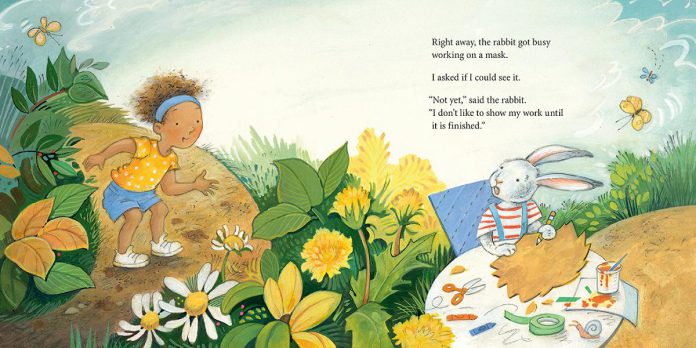
“He doesn’t like to show me his work before it’s finished and he doesn’t like parties, just like Rabbit,” Eugenie says, referring to her husband, while acknowledging that she’s more similar to the other characters in her book. “I can go either way. I can go out and do presentations with kids, but also enjoy my time in my studio.”
As with When Rabbit Was a Lion, most of Eugenie’s story ideas come from observing the world around her. As the daughter of comic illustrator Creig Flessel, storytelling and art “was a part of growing up” on Long Island in New York.
“Storytelling was just part of the conversations we had,” Eugenie recalls. “If we were sitting out on the porch and a boy walked down the hill with a fishing pole going towards the beach, then we would start telling a story about that boy. We would think about what would happen, or what fish he would catch.”
Since then, Eugenie has lived a whole lifetime of writing and publishing children’s books, including writing the award-winning Kitten’s series and Earth Magic, which was shortlisted for the Governor General’s Literary Award. She has illustrated for numerous acclaimed authors including Robert Munsch — who actually came visited her home in Kawartha Lakes once — and Eric Walters.
Even all these stories later, Eugenie continues to stumble upon her ideas in the same way: by observing the world around her.
“Ideas are around us all the time like radio waves, and if you want to hear what it is, you’ve got to tune into the station,” she says, adding that she used to get inspiration from her children when they were young. “Stories present themselves to you and you have to grab them as they float by.”
Having been an illustrator for so long, Eugenie has seen a change throughout her career in the types of books being written for children, with the demand for more stories about social issues. This is evident in When Rabbit was a Lion which, in a lot of ways, is not only about introverts and socialization but about understanding anxiety.
“It’s dealing with life and giving children the tools to understand in a gentle way so it expands their world,” Eugenie explains. “Children have very much the same emotional reactions to things as adults do. It’s in their own sphere, but they’re (also) happy, sad, anxious, and curious. They’re just the same and I think is really important that books don’t talk down to children.”
On January 23, Eugenie made a post to Instagram about how someone once said to her “It’s just a children’s book; it’s not as though it’s War and Peace.” The statement was met with a positive response from her followers who explained how valuable her work is.
Eugenie, herself, labelled the comparison as “apples and oranges.”
“People think it’s easy to write a children’s book and maybe in some ways it is, but the tricky part is to say it with fewer words and it has to be interesting enough that adults want to read it,” Eugenie says, adding that unlike with other literature, it also matters how the words sound.
“The rhythm and rhyme matters. Like music, the sound of the words and how they feel in your mouth is important.”
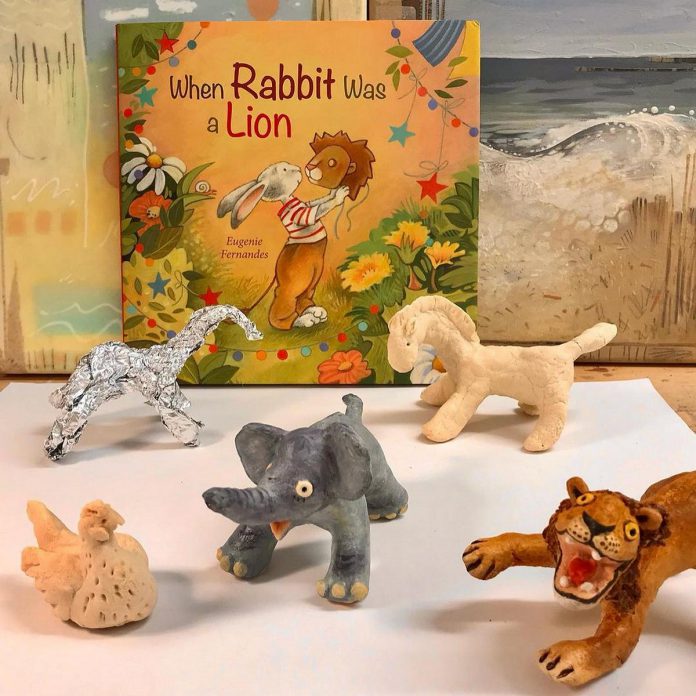
With the number of times she hears about people connecting to her work even in adulthood, Eugenie says it’s important to recognize how these stories can shape a child’s relationship to reading.
“You have to tap into what children are feeling or dealing with, even if it’s a bit silly,” she notes. “Children have to learn how to read so they can grow up to read more and teach. It’s also so special just to have someone who loves you read to you. That’s how you create a reader.”
For more information about Eugenie Fernandes, follow her at @eugeniefernandesart on Instagram. For more information about Snofest Family Sunday with Eugenie Fernandes at the Art Gallery of Peterborough, visit agp.on.ca/events/snofest.


